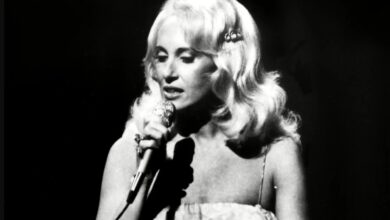Deana Carter’s “Strawberry Wine” Redefines ’90s Country Romance and Becomes a Generation’s Coming-of-Age Anthem
Released in August 1996, “Strawberry Wine” arrived like a warm, nostalgic breeze across the landscape of country music. Deana Carter’s debut single didn’t just launch her career—it reintroduced emotional storytelling to a genre that was rapidly shifting toward slicker, pop-influenced sounds. The song went on to top the Billboard Hot Country Singles & Tracks chart for two weeks, earning critical acclaim and resonating deeply with a generation raised on both wide-open farmland and personal longing. More than just a hit, it became a rite of passage for young listeners in the mid-90s.
Born in Nashville to studio guitarist Fred Carter Jr., Deana Carter grew up surrounded by music legends like Willie Nelson and Waylon Jennings. But her path to stardom wasn’t immediate. She initially pursued a career in rehabilitation therapy before returning to her musical roots in her mid-20s. Carter’s soft-spoken confidence and easygoing presence gave her wide appeal, but it was her ability to interpret songs with both sincerity and nuance that set her apart from other emerging artists in the country-pop crossover wave.
“Strawberry Wine” was written by Matraca Berg and Gary Harrison, two of Nashville’s most respected songwriters. Berg drew from her own memories of summer love and emotional awakening to craft the lyrics, which captured the bittersweet ache of first love in a way that felt both poetic and authentic. When Carter first heard the song, she reportedly broke down in tears. She knew immediately it was the story she had to tell.
Produced by Chris Farren, the recording leaned into gentle pedal steel, soft acoustic guitar, and Carter’s breathy, expressive vocals. The arrangement didn’t scream for attention—it invited listeners in quietly, letting the lyrics and melody lead. Carter’s voice carried both innocence and emotional maturity, balancing youthful curiosity with grown-up reflection. That vulnerability became the song’s heartbeat.
The reception was nothing short of remarkable. Upon its release, “Strawberry Wine” climbed the charts swiftly, reaching No. 1 in November 1996. It remained on the country charts for more than six months and won the 1997 Country Music Association Award for Single of the Year. It also earned Grammy nominations, cementing Carter’s place among the rising stars of that decade.
Beyond its chart success, the song changed the tone of ’90s country radio. It opened the door for more female-led, emotionally-driven songs in an industry that had, at the time, leaned heavily into male-dominated, boot-stomping anthems. The track’s unflinching look at youthful vulnerability helped shift the conversation around what country songs could talk about—and who was allowed to tell those stories.
For Deana Carter, the success of “Strawberry Wine” was transformative. It established her as a major voice in country music, leading to a multi-platinum debut album, Did I Shave My Legs for This? She found herself on major tours, television appearances, and award show stages. The song gave her a fan base that wasn’t just large—it was deeply connected to her through shared experience and memory.
The influence of the song extended far beyond Carter’s own catalog. Many female country artists—such as Kacey Musgraves, Carly Pearce, and Ashley McBryde—have cited “Strawberry Wine” as a formative track that made them feel seen and inspired them to write from the heart. Its success helped normalize intimate storytelling and memory-driven lyrics in a genre that had sometimes favored image over introspection.
Numerous artists have covered or performed the song live, including Kelly Clarkson and Lauren Alaina, often noting how emotionally powerful it remains. Each rendition brings something new, but the original remains definitive—a snapshot of a young woman singing a memory that feels like everyone’s own.
Interestingly, at the time of the song’s success, Carter was navigating the sudden transition from obscurity to stardom. She’s spoken about how overwhelming it felt to have her most personal work become such a public phenomenon. But in many ways, that tension mirrored the song itself—a delicate balancing act between innocence and adulthood.
Today, “Strawberry Wine” is considered one of the most iconic country songs of the ’90s. It appears on countless best-of lists and is still a mainstay on country radio, especially during the warm months when nostalgia runs thick. Its staying power comes not from gimmicks but from the honesty embedded in every note.
Its success also paved the way for a more introspective style of country music that allowed emotion to take center stage. Where once chart-toppers had focused on trucks, honky-tonks, and heartbreak barroom style, “Strawberry Wine” suggested that memory, loss, and gentle reflection could be just as commercially and emotionally powerful.
Though Carter would never replicate the massive success of this single, she embraced its legacy and continued writing and performing songs that stayed true to her voice. The track remains a cornerstone of her live performances and a fan favorite that brings generations together with one chorus.
In the end, “Strawberry Wine” endures because it speaks a universal truth—everyone remembers their first love, their first summer of freedom, and the ache that lingers long after. With its poetic lyrics, delicate production, and heartfelt delivery, the song remains a bittersweet reminder that some moments in life, like that first sip of something sweet, stay with you forever.



